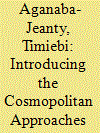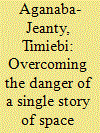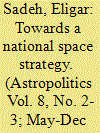| Srl | Item |
| 1 |
ID:
157171


|
|
|
|
|
| Summary/Abstract |
Third World Approaches to International Law or TWAIL is a useful starting point to assess space governance issues from the perspective of emerging or aspirant space actors and users because it helps to highlight imbalances and asymmetry around the supposed “legal right” to space benefit under Article I(1) of the Outer Space Treaty. However, a new analytical lens focused on Cosmopolitan Approaches to International Law or CAIL is proposed that can deconstruct the existing agenda in light of it obscuring the idea of shared benefits without attributing blame, scepticism or negativity, a charge often placed against TWAIL perspectives. This paper asks what one learns from the space law context that prompts us to reorient the frame of analysis that TWAIL perspective brings to bear and focus on a CAILian perspective. Primarily that a TWAILian approach is too one sided and polarized and that a CAILian approach acknowledges reciprocal responsibilities. It highlights the implications of the approach both for emerging and aspirant as well as established space nations specifically and for global space governance in general.
|
|
|
|
|
|
|
|
|
|
|
|
|
|
|
|
| 2 |
ID:
147516


|
|
|
|
|
| Summary/Abstract |
space governance issues from the perspective of emerging or aspirant space actors and users because it helps to highlight imbalances and asymmetry around the “legal right” to space benefit under Article I(1) of the Outer Space Treaty. However, a new analytical lens focused on Cosmopolitan Approaches to International Law or CAIL is proposed that can deconstruct the existing agenda in light of it obscuring the idea of shared benefits without attributing blame, scepticism or negativity. In the quest to ensure fairness to all, including aspirant emerging space actors, largely from developing States, this paper asks what does one learn from the space law context that prompts us to reorient the frame of analysis that Third World Approaches to International Law (TWAIL) perspective brings to bear and focus on a CAILian perspective? Primarily that a TWAILian approach is too one sided and polarized. A CAILian approach however acknowledges reciprocal responsibilities. In conclusion, I am not making a claim here that my CAILian concept has never been articulated before. However, the way I link the concept of Cosmopolitanism with a school of thought that I am sympathetic to (TWAIL) is where this paper provides a novel idea. My specific version of Cosmopolitanism bears in mind the importance of collective ideas. While CAIL will not be free from power asymmetry's because there will always be polarity; it still chooses to focus on the middle ground and not to focus on extremes.
|
|
|
|
|
|
|
|
|
|
|
|
|
|
|
|
| 3 |
ID:
101231


|
|
|
|
|
| Publication |
2010.
|
| Summary/Abstract |
Obama Administration officials have indicated that international cooperation will play a greater role in their national space policy than it did during the Bush Administration. But they have not provided a clear and consistent logic specifying why the United States wants more space cooperation, what types of cooperation it will pursue, and how it will convince other countries to agree on, and comply with, accords that produce the desired policy results. Instead, their policy about space cooperation mixes elements from three different and somewhat contradictory strategic logics: a "Global Commons" logic, a "Strategic Stability" logic, and a "Space Governance for Global Security" logic. While each logic has attractive features, the Global Commons logic is unlikely to achieve significant results in a short period of time, while the Strategic Stability logic is more likely to promote competition, rather than cooperation. Following the Space Governance for Global Security logic could yield much larger dividends by using positive and negative forms of space cooperation to gain widespread support for the equitable rules and effective international institutions needed to address the central challenges identified by the 2010 National Security Strategy.
|
|
|
|
|
|
|
|
|
|
|
|
|
|
|
|
| 4 |
ID:
101219


|
|
|